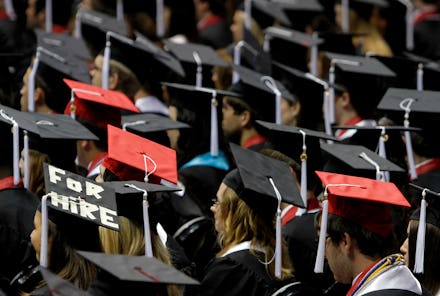The Only Thing More Expensive Than College is Not Going to College

Millennials are the best-educated American generation in history, with more than 1-in-3 possessing a college degree by early adulthood. And those degrees pay off big-time in the job market. Graduates aged 25-32 now typically make $45,500 a year.
But experts at the Pew Research Center noticed something alarming in a new report. Despite all that education, the median, inflation-adjusted income of the average 25-32-year-olds had remained almost stationary since 1965. And the reason is that the average wages of people possessing just a high school diploma have plummeted.
Even after inflation is taken into account, the average high-school graduate's income has fallen 10% since 1965.
According to Pew, while those young college-educated workers are earning $45,500, those with a two-year degree or some college earn just $30,000, while those without any degree or college make $28,000. In 1965, the earnings gap between the college-educated and high school graduates was $7,400. Today it's $17,500.
Here's what that trend looks like, generation to generation.
Pew notes that an uncertain economy and rising college tuition rates have made some younger Millennials question whether or not it's worth the cost to go to college. Their survey found that 66% of Millennials had borrowed to pay for school, compared to 59% of Gen X'ers and 43% of baby boomers. Despite that cost, it's clear that for people who make it to graduation, secondary education is still a wise investment.
"For today's young adults, the only thing more expensive than going to college is not going to college," says report co-author Paul Taylor. "And that sort of captures the dilemma that many find themselves in."
Adding to that dillemma is the painful position that those who fail to graduate from college find themselves in. While they may find themselves in tens of thousands of dollars of debt, their long-term earnings are negligibly different from those who didn't attend college at all.
In a society that's becoming noticeably less equitable, these statistics should worry everyone.